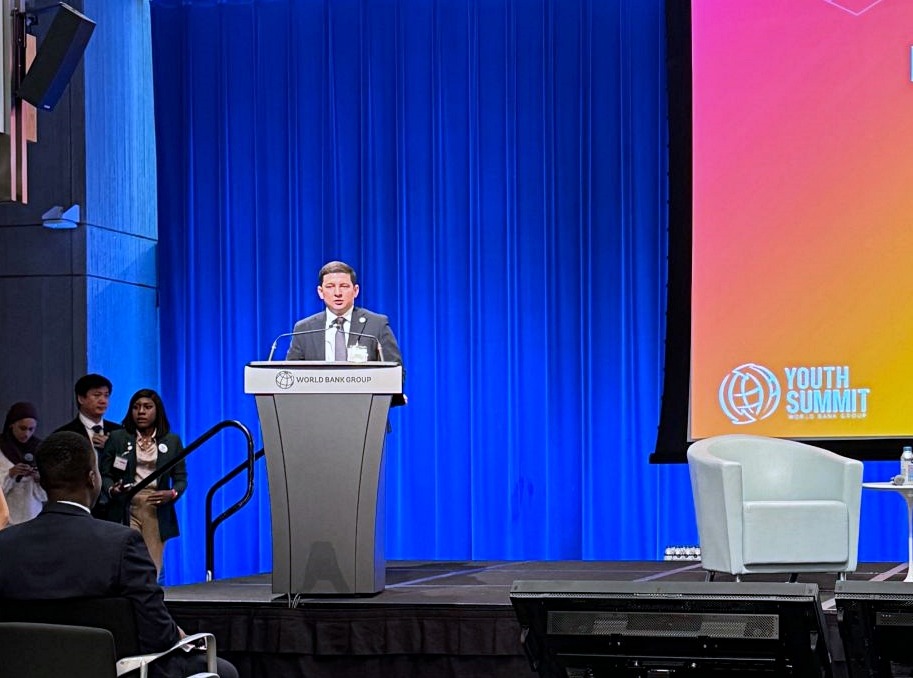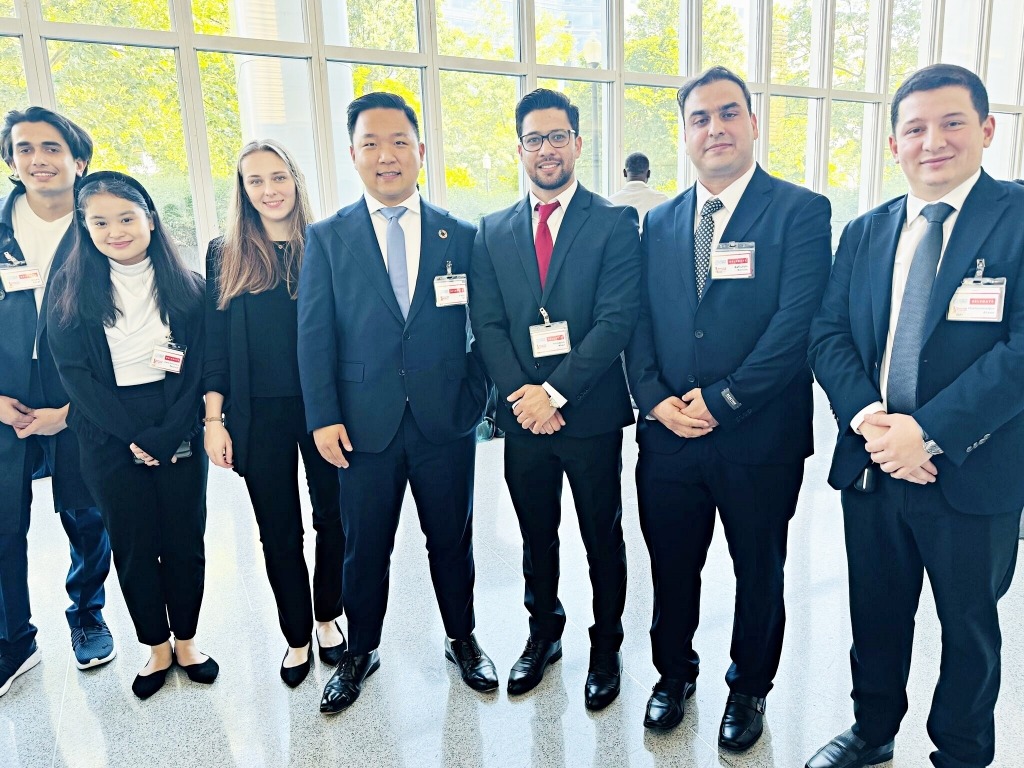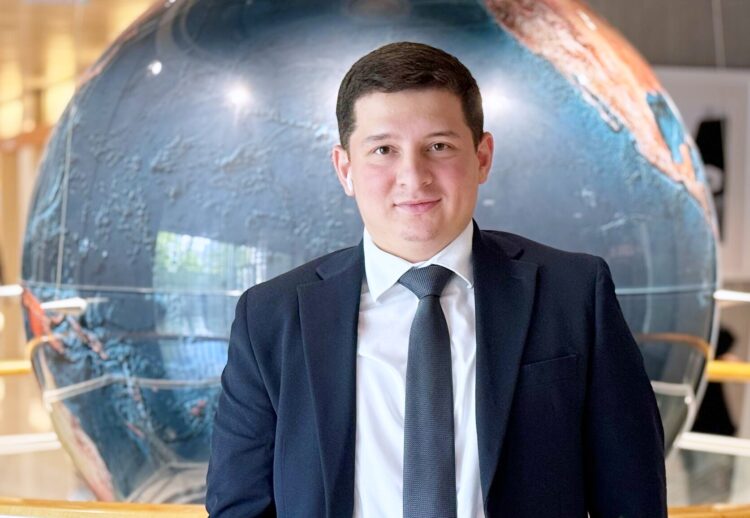In an era where Gen-Z is reshaping global leadership, Mukhammadjon Ataev leads the charge as a prime example of youth-driven change. At just 11 years old, he successfully campaigned to ban energy drinks from his school in Samarkand, Uzbekistan. Today, as a George Washington University School of Business fellow, Ataev is transforming cultural education through Augmented Reality (AR) and building an EdTech platform that helps students from developing countries access world-class education.
“Change doesn’t require being a politician or public figure,” Ataev says. His journey from an advocate in Uzbekistan’s historic “Pearl of the Orient” to a voice for Central Asian youth at the UN Summit of the Future illustrates how diplomacy begins with community connections. Growing up in a city where over 100 nationalities celebrate both Ramadan and Easter, Ataev learned early that true diplomacy is about bridging cultures.
In this edition of Young and Diplomatic, we explore how the next generation of Central Asian leaders are using technology, entrepreneurship, and cross-cultural understanding to drive global impact. From organizing peer review clubs to representing youth interests in international forums, Ataev’s story focuses on how Gen-Z is reshaping the approach to diplomacy in the digital age.
Growing up in Samarkand, known as the “Pearl of the Orient,” how did living among 100+ nationalities shape your understanding of diplomacy?
Samarkand, shaped for centuries by diverse cultures, has been a significant city in various empires. After conquering Samarkand, Alexander the Great remarked: “Everything I have heard about the beauty of Samarkand is true, except it is even more beautiful than I could have imagined.” This sentiment applies not only to its architecture but also to the harmonious coexistence of its people from different religions, cultures, and linguistic backgrounds. I grew up in a community where Ramadan and Easter were celebrated together, traditions were respected, multiple languages were spoken, and neighbors were treated like family. This multicultural environment instilled in me the values of empathy, communication, and the importance of finding common ground.
In Samarkand, I witnessed how the coexistence of diverse communities depended on mutual respect and collaboration, whether during festivals, community problem-solving, or daily interactions. These experiences taught me how dialogue can resolve conflicts and foster lasting connections. Growing up in such a historically significant and multicultural city inspired my approach to diplomacy as a bridge-building endeavor, where mutual understanding and shared goals unite even the most diverse groups.
These experiences show the value of diversity, inclusivity, and respect, which I believe are foundational to diplomacy.

You’ve mentioned that diplomacy isn’t just about politics. Can you elaborate on how your EdTech startup embodies diplomatic principles?
During the 2024 Paris Olympics, a Kyrgyzstan boxing coach faced visa issues and could not participate. Uzbek coaches stepped in to assist the Kyrgyz boxer, who went on to win a bronze medal. This viral moment demonstrated how mutual respect and collaboration can sometimes achieve what politics cannot.
The idea for my startup stemmed from personal challenges. Cultural differences complicated my application process to top universities. In Uzbekistan, humility and modesty are emphasized, whereas universities value stories that showcase achievements. Additionally, many individuals choose careers based on prestige or family expectations, often resulting in dissatisfaction.
My EdTech startup aims to help individuals discover their passions, understand their strengths, articulate their stories, and gain admission to top universities worldwide. This empowers youth from developing countries, giving them a voice in reputable institutions. By building a global network of skilled individuals, the startup serves as a bridge across boundaries, fostering dialogue, cultural exchange, and collaboration on projects for sustainable development.
Aligned with SDG 4 (Access to Quality Education), our startup demonstrates shared responsibility for global challenges, embodying the principles of diplomacy.
How has your family background, particularly your grandfather’s journey from a small village to becoming a pilot, influenced your approach to leadership?
My family’s story has always illustrated the power of hard work and dedication. My grandfather, who studied only 15 days a month under moonlight in his small village, remains a source of inspiration. I spent countless hours listening to his stories and life lessons, including one of his most impactful teachings: “Hard work and dedication will help you achieve success, but love and care for family and community make you a true leader.”
His journey showed me that success is not determined by one’s starting point but by commitment and determination. His sense of community shaped my perspective on leadership as a means to uplift those around me. During my career, I have realized that the most valuable asset for any leader is the people who contribute to shared success. This understanding, combined with my grandfather’s teachings, drives me to create opportunities for others, ensuring my leadership reflects empathy, inclusiveness, and a focus on development.
His deep love for Uzbekistan also inspired me to contribute to my country’s progress. While studying at a prestigious university in the U.S., I initiated a partnership between the GW Office of Innovation and Entrepreneurship and Uzbekistan’s Agency of Innovation. This collaboration supports startup ecosystem development and research commercialization.
What motivated you to prohibit the sale of energy drinks and junk food at your school, and how did you achieve this?
At age 11, I was concerned about the health of my peers. My parents had always emphasized healthy eating, and my research confirmed the harmful effects of energy drinks and snacks. However, these products remained popular, often associated with being “cool” or as status symbols.
Determined to make a change, I pooled my savings, borrowed money from my parents, and purchased all the snacks and drinks in the school café. I then disposed of them in a trash can, explaining to my peers that these items were harmful and did not define their worth or status.
This act caught the attention of the school administration. After explaining my intentions, school officials supported my cause and banned the sale of these products.
During your participation in the UN Summit of the Future, what key message did you convey as a representative of Uzbek youth?
The UN Summit of the Future provided an excellent platform for dialogue between youth and the United Nations. I focused on addressing several pressing issues.
The primary topic I discussed with UN officials was the challenge of youth empowerment worldwide, particularly in developing countries. Secretary-General António Guterres highlighted the significant generation gap, and I emphasized how this, combined with bureaucratic hurdles, limits young people from assuming leadership roles.
I also raised concerns about the UN’s level of attention toward Central Asia and how it supports the promotion of the region. Coming from Central Asia, I observed that the region remains underrepresented in UN programs and collaborative agendas.
Another key focus was the role of digitalization in achieving Sustainable Development Goals (SDGs). Digital transformation remains underestimated, yet digital tools can significantly advance development, particularly in achieving SDG 4: Quality Education. I stressed the importance of international collaboration to bridge the digital divide, ensuring young people, especially in developing countries, have the necessary tools and opportunities to succeed in a rapidly changing world. I advocated for integrating digital literacy into educational curricula to prepare the next generation for future challenges and opportunities.

How does your business background complement your diplomatic endeavors?
As mentioned earlier, diplomacy and business share common tools for building strong relationships. National brands represent countries globally, while multinational businesses thrive by respecting cultural differences and fostering collaboration among diverse teams.
From a business perspective, I recognize that the skillset required in management closely aligns with the qualities of effective diplomacy. Through my education and professional experience, I have honed the ability to identify opportunities, negotiate strategically, and develop value-driven solutions—skills essential to both business and diplomacy.
In business, collaboration, innovation, and problem-solving are central to achieving shared goals. These principles also underpin successful diplomacy, where fostering understanding and cooperation among diverse stakeholders is critical.
Moreover, running a business increases access to resources and creates opportunities to empower individuals, strengthen communities, and contribute to global progress.

Could you share a specific example of a “best practice” you discovered abroad that you believe could benefit Uzbekistan?
Two key practices stand out: fostering entrepreneurship and promoting social development.
First, the U.S. excels at cultivating entrepreneurship through university-led innovation ecosystems and programs like I-Corps. These initiatives guide participants through the lifecycle of start-ups, helping them create impactful products. Institutions such as the George Washington University (GW) Office of Innovation and Entrepreneurship act as hubs where students, researchers, and entrepreneurs collaborate to transform ideas into viable businesses. Courses modeled on I-Corps provide a structured roadmap for shaping innovative solutions, enabling entrepreneurs to address real-world challenges.
Second, I admire certain aspects of parenting in the U.S., which could inform social development in Uzbekistan. American parents often treat their children as independent decision-makers, encouraging responsibility and accountability. Financial literacy is also emphasized early, as many children work during their school years and learn to manage their own finances. While this model may not fully align with Uzbek traditions, incorporating elements of it could foster greater independence and responsibility among youth.
What role do you think technology plays in modern diplomacy, especially given your experience with AR projects like “NazzAR”?
Technology plays an indispensable role in modern diplomacy by fostering collaboration across borders and accelerating progress. The COVID-19 pandemic underscored its significance, with platforms like Zoom enabling international meetings and project continuity despite physical separation. Technology enhances transparency, accountability, and inclusivity by allowing virtual participation in global discussions, especially for those in developing countries.
My experience with NazzAR has demonstrated how augmented reality (AR) can drive cultural and educational diplomacy. By animating historical figures, NazzAR makes learning about history and culture more engaging. These projects have served as a “business card” for Uzbekistan, presented to the Presidents of South Korea and Germany during their visits. Such innovative tools highlight cultural richness, fostering dialogue and mutual appreciation.
Technology also bridges historical and cultural connections. For instance, the Turkic Council emphasizes shared history, and modern technologies like AR can deepen these ties, promoting respect and collaboration among nations.
How do you balance profit-making with community development in your business ventures?
Although my current ventures are profit-driven, they are designed with a clear focus on addressing community needs. For example, my EdTech startup not only helps individuals gain admission to top universities but also empowers them by identifying their unique strengths and passions. This approach creates value while contributing to societal development through education and capacity-building.
My father instilled in me the principles of honesty and giving back to the community. He often said: “Water cannot stand in a desert, but if you create an oasis around it, it will endure.” This philosophy guides my ventures—I invest in fair treatment of employees, human capital development, and community projects. For instance, our startup offers need-based scholarships to talented youth who cannot afford our services.
Moreover, I strive to build a network of talented individuals committed to tackling global challenges. By driving innovation and creating opportunities, my businesses aim to make lives easier while delivering positive change.

As a young citizen diplomat from Uzbekistan, what unique perspective do you bring to international dialogues?
I prefer the term “responsible citizen” rather than “diplomat,” as it underlines broader engagement beyond politics. Representing the youth of Uzbekistan, I bring a perspective shaped by the country’s cultural diversity, strategic location at the crossroads of civilizations, and rapid development.
Growing up in Samarkand, a historic hub of trade and cultural exchange along the Silk Road, I value inclusivity, cross-cultural understanding, and collaboration. These experiences enable me to advocate for greater visibility of Central Asia in global discussions, reminding the world of the region’s historical contributions to science and culture through figures like Al-Khorezmi, Ibn Sina, and Mirzo Ulugbek.
I also bring the perspective of a young professional bridging gaps between innovation, education, and diplomacy. By advancing partnerships between international institutions and Uzbekistan’s agencies, I emphasize youth empowerment, digital transformation, and sustainable development. Leveraging technology to bridge the digital divide and creating equitable opportunities are central to my vision for a more inclusive global future.









